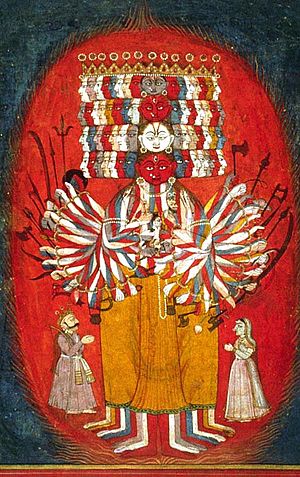Monotheism facts for kids
Monotheism is the belief in only one god. This is different from polytheism, which is believing in many gods, like people did in Ancient Greece, Ancient Rome, and Ancient Egypt. Many religions around the world are monotheistic.
Contents
What is Monotheism?
Monotheism comes from two Greek words: "monos," meaning "single," and "theos," meaning "god." So, it literally means "single god." People who follow monotheistic religions believe there is only one supreme being who created the universe. This one God is often seen as all-powerful and all-knowing.
Monotheism vs. Polytheism
The main difference between monotheism and polytheism is the number of gods people believe in.
- Monotheism: Believes in one God. Examples include Judaism, Christianity, and Islam.
- Polytheism: Believes in many gods and goddesses. These gods often have different roles, like a god of the sky or a goddess of love. Ancient Greek and Roman religions are good examples of polytheism.
Major Monotheistic Religions
Many of the world's largest religions are monotheistic. They share the idea of one God, but their beliefs and practices can be quite different.
Judaism
Judaism is one of the oldest monotheistic religions. Its followers believe in one God who made a special agreement, or covenant, with Abraham and his descendants. The main holy book in Judaism is the Torah. Jewish people believe God gave them laws to live by.
Christianity
Christianity is the largest monotheistic religion in the world. Christians believe in one God who exists as the Father, the Son (Jesus Christ), and the Holy Spirit. They believe Jesus Christ is the Son of God and the savior of humanity. The Bible is the main holy book for Christians.
Islam
Islam is another major monotheistic religion. Muslims believe in one God, called Allah in Arabic. They believe that God revealed his word to the prophet Muhammad. The holy book of Islam is the Quran. Muslims follow the teachings of the Quran and the example of Muhammad.
Other Monotheistic Faiths
There are many other religions that also believe in one God.
- Baha'i Faith teaches that there is one God who sends divine messengers to guide humanity.
- Sikhism believes in one God, called Waheguru, and focuses on equality and service.
- Zoroastrianism is one of the oldest monotheistic religions, believing in one uncreated God, Ahura Mazda.
- Deism believes in a creator God who set the universe in motion but does not interfere with it.
- Cao Dai and Tenrikyo are newer religions that also focus on the worship of a single, supreme being.
History of Monotheism
The idea of one God has been around for a very long time.
Ancient Roots
Some of the earliest ideas about one God can be found in ancient times. For example, in ancient Egypt, Pharaoh Akhenaten tried to make his people worship only one sun god, Aten, around 1350 BC. This was a very early form of monotheism, though it didn't last long after he died.
Important Thinkers
Over time, many thinkers and prophets helped shape monotheistic beliefs. People like Abraham, Moses, Jesus, and Muhammad are central figures in the history of monotheism. They taught about the nature of the one God and how people should live. The Greek philosopher Xenophanes also questioned the idea of many gods, suggesting there was only one supreme God.
Why is Monotheism Important?
Monotheism has had a huge impact on human history and culture. It has shaped laws, art, music, and how societies are organized. For many people, believing in one God gives meaning to life and provides a moral guide. It often encourages a sense of unity and purpose among followers.
Images for kids
-
Fictionalized portrait of Xenophanes from a 17th-century engraving
-
God in The Creation of Adam, fresco by Michelangelo (c. 1508–1512)
-
Pharaoh Akhenaten and his family adoring the Aten.
 In Spanish: Monoteísmo para niños
In Spanish: Monoteísmo para niños
 | DeHart Hubbard |
 | Wilma Rudolph |
 | Jesse Owens |
 | Jackie Joyner-Kersee |
 | Major Taylor |










